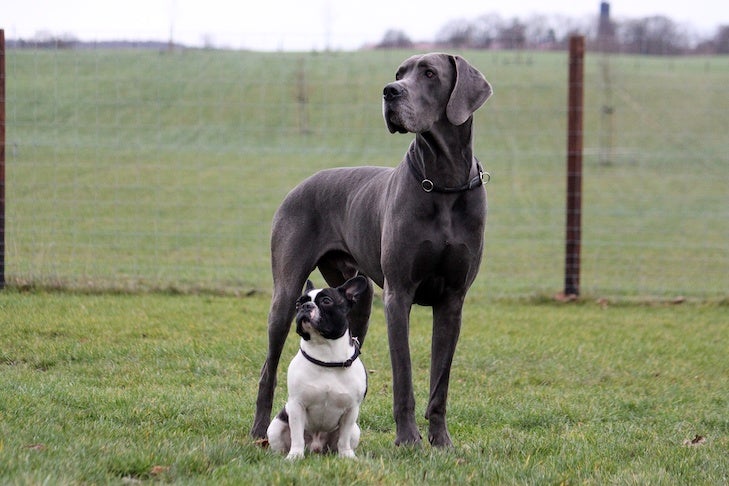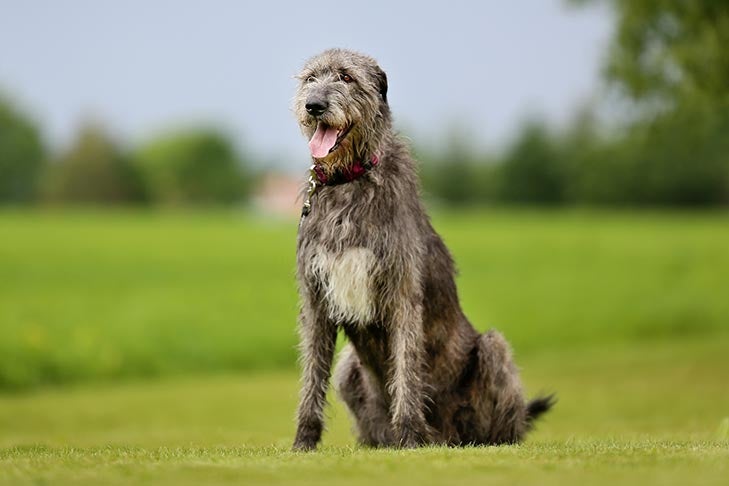
When it comes to the lifespan of dogs, researchers have found that size matters. Owners of small dogs can expect to enjoy several more years with their pets than the owners of large dogs.
It doesn’t seem to make much sense: large mammals, like elephants and whales, tend to live longer than small ones, like mice. So why, then, do small dogs have a longer average lifespan than larger breeds?
This phenomenon has baffled scientists for years, and although the reason why is still uncertain, there are several theories that researchers have explored. In addition to being important to the health of our canine companions, scientists hope this research will allow them to gain a better understanding of the human aging process because as dogs age, they experience many of the same conditions we have – such as arthritis, cancer, and diabetes.
Human Vs. Dog Years
It’s important to understand what it really means when we say how old our dogs are. Dogs and people age at very different rates. When dogs reach one year old, veterinarians estimate they have matured as much as people have when they reach 15 years old. The second year in a dog’s life equates to about another 9 years for a human. And after that, the aging process in dogs varies based on their age and size.
Size Matters
Although large mammals tend to live the longest, small body size within a species is associated with longer life and slower aging. Canis familiaris, aka the domestic dog, is a species with a huge size range when it comes to its breeds.
Cornelia Kraus, an evolutionary biologist at the University of Göttingen in Germany, was the lead researcher of a major study of 74 breeds and more than 56,000 dogs seen in North American veterinary teaching hospitals. Kraus reported that large dogs age at an accelerated pace, and “their lives seem to unwind in fast motion.”
In the study, large breeds died more often from cancer than small breeds. Why? One possibility Kraus suggests is that large breeds grow faster, so they may be more likely than small dogs to also experience the abnormal cell growth seen in cancer. Or because they age more quickly, large dogs may succumb to age-related illnesses sooner.

A researcher at the University of Washington, Dr. Silvan Urfer, conducted a large study, collecting data on 169,000 dogs who died or were euthanized within a three-year period at U.S. veterinary clinics. He found a correlation between the breed of the dogs and their age at death. For example, among giant breeds, Great Pyrenees lived longer (11.55 years) than Great Danes (9.63 years).
In Dr. Urfer’s study, small dogs had a longer median lifespan at 14.95 years, medium-size dogs lived an average of 13.86 years, and large dogs lived 13.38 years. The dog’s body size was the most important variable in predicting lifespan, more important than whether or not the dog was purebred.
Breeding
Another factor researchers have studied is the size of the breeding population, and its impact on health and longevity. One study of companion dogs “did not find significant differences in lifespan between purebred and mixed breed dogs; however, breeds with larger effective population sizes and/or lower inbreeding coefficients had median survival times 3-6 months longer than breeds with smaller effective population sizes or higher inbreeding coefficients, indicating that these measures of genetic diversity may be affecting breed lifespans.”
Dental Health
In the Journal of the American Animal Hospital Association, Dr. Urfer reported when comparing two dogs with all other factors being equal, that he found annual dental cleanings conducted by a veterinarian reducing risk of death by almost 20 percent. Dr. Urfer pointed out that there could be a direct association between good dental health and good general health, but it might also be that dog owners who take good care of their dog’s teeth would also be more likely to provide preventive and veterinary care that contribute to longevity.
Weight
New research from the WALTHAM Centre for Pet Nutrition and the University of Liverpool revealed overweight and obese dogs are more likely to have shorter lives than those at ideal body weight. Study co-author and Professor of Small Animal Medicine at the University of Liverpool Alex German said, “Owners are often unaware that their dog is overweight, and many may not realize the impact that it can have on health. What they may not know is that, if their beloved pet is too heavy, they are more likely to suffer from other problems such as joint disease, breathing issues, and certain types of cancer, as well as having a poorer quality of life. These health and wellbeing issues can significantly impact how long they live.”
One study that focused on 12 specific breeds found the effect on lifespan of extra weight on the smallest dogs, such as Yorkshire Terriers, was even greater (overweight: 13.7 years, normal: 16.2 years) than the effect on larger dogs such as German Shepherd Dogs.

Cognitive Development
Another study asked a very interesting question about dog cognition. Since large dogs have a speedier growth rate and physiological pace of aging than small dogs, do they also have a faster pace of cognitive development? Researchers measured cognitive development and aging in more than 4,000 dogs from 66 breeds using nine memory and decision-making tasks. They found that all breeds, regardless of size or lifespan, tended to follow the same speed of cognitive aging, no matter the size of the dog.
The Search Goes On
These findings are just the tip of the iceberg in our understanding of canine lifespans and what determines them. A grant from the National Institute on Aging is funding a project, called the Dog Aging Project, to explore the biological and environmental determinants of aging in dogs.
The project is based at the University of Washington and Texas A&M College of Veterinary Medicine and Biomedical Sciences. Nearly 30,000 dogs and their owners from across the U.S. are participating. Scientists and research veterinarians from 20 research institutions and veterinary teaching hospitals are following the health and aging process of these dogs for 10 years or more to understand how genes, lifestyle, and environment influence aging.
According to the project website, “This information will be used to gain insights that will increase our ability to prevent, diagnose, and treat age-related diseases, thereby helping our dogs, and by extension, ourselves, live longer, healthier lives.”
How Can I Make My Dog Live longer?
Thanks to advances in veterinary science and preventive medicine, the life expectancy of our dogs is increasing. We can help our dogs live longer higher quality lives by:
- Feeding a healthy diet
- Helping maintain a healthy weight.
- Encouraging breed- and age-appropriate physical and mental exercise.
- Taking our dogs for annual veterinary checkups and vaccinations.
- Providing preventive dental care.
- Administering heartworm, flea and tick preventatives.
- Keeping them safe from accidents.
- Providing love and affection.
Celebrate the October “AKC Treat of the Month” with 35% off of Dogswell Immune System treats. A boosted immunity can help with longevity. Offer valid October 1 through October 31. Use promo code 35IMMUNITY during checkout on Amazon.

